Psst, I'm gonna tell you a secret. Move close and hold your breath. This is news for a select few only; it's gonna blow you away. Here it goes. "As flu seasons go, this one isn't bad." Sounds a bit like old news you say, like honeyed reflections of a golden past, sweet dreams that were brutally smashed by a cruel reality? It's all a question of where you get your news, I respond.
The earlier quote was taken from an article on influenza in the May 04, 2009, issue of TIME magazine, which I still receive in my mailbox every week, even though the person whose name is on the plastic cover hasn't lived at my address for at least two years and isn't known to me. I don't take TIME seriously. I read it for amusement and diversion, but even with this forgiving approach, it was very hard to accept this article as something that would actually make it into print.
Later, investigating the subject in more detail, I discovered that the article was actually recycled into the magazine after being published online a month and a half earlier. How pathetic. Are there no current affairs to report on? What about diplomatic rapprochement between Turkey and Armenia? What about robots doing hypothesis-driven research? What about Sergio Marchionne's visions of economic grandeur? It might say TIME on the cover, but there's no news inside.
On the other hand, it might not say MAD on the cover, but it's nearly unbeatable when it comes to satire. Read the article on influenza and be amused (as long as you're not affected yet, knock on wood), though it's not nearly as funny as the hilarious bomb of a one-liner that opened it. The real killer comes a few pages later, an esoteric three columns on "embedded food", "foods with embedded positive intentions".
What the hell, you might think, pictures of hungry TV reporters in Iraq flashing before your mind's eye. You'd be completely off. The article goes like this: A bottling company infuses their water with wishes for love, joy and perfect health. A chocolatier plays tapes of praying Tibetan monks' brain waves while cooking up the brown goo. A protein maker has his employees dance around the packaging robots chanting invocations of some divinity.
It seemed to me that in a devious ploy of cross-marketing, TIME magazine had imbued their pages with limitless hilarity. Once my brain had finally accepted what my eyes were trying to communicate, I laughed myself off the sofa. Yet there is not a hint of sarcasm in the lines. Even a supporting statement from a researcher at the Institute of Noetic Sciences in Petaluma, Calif. (I'm not making this up, I promise!), is presented with dead seriousness. Are people really that gullible? And what kind of character buys TIME?
The answer to this last question comes a few pages later. The ten top things to do in Singapore include (and again, in spite of my best efforts, I didn't make this up) "Plastic Surgery": "You might not have time for a full makeover, but squeeze in a spot of Botox or a nonsurgical face-life with local celebrity surgeon Woffles Wu." Idiots – the target group of TIME.
I was gonna wrap up this post with some clever twist to the tune of my pumping my best wishes for my esteemed readers into these lines as I write them, for you to feel them and feel invigorated when you read them, no matter how far you are. But I lack the energy. All I manage to do is point out that both MAD and TIME belong to (AOL) Time Warner and conjecture that they merged their editorial boards reflecting harsh economic times. Next week's issue will show how much truth there is to that. I surely will keep reading, for entertainment though not for news.



